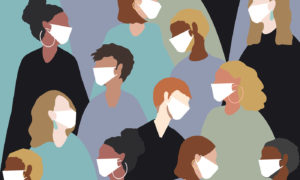
A roundup of articles on the status of the Coronavirus and ways we can help….

© EPA-EFE/Francois Lenoir
Von der Leyen: EU plans to spend €100bn to save jobs during coronavirus crisis
European Commission President Ursula von der Leyen holds a news conference detailing EU efforts to limit economic impact of the coronavirus disease.
Ursula von der Leyen has laid out plans to borrow and spend €100bn to stop firms in the EU laying off staff during the coronavirus pandemic, and has apologised to the Italian people for the bloc’s lack of solidarity.
The president of the European commission said she was confident the 27 member states would back her scheme, describing the EU’s budget as the Marshall plan for the crisis, in reference to the post-second world war fund that rebuilt Europe.
The EU’s executive branch is proposing to borrow from the international markets and make loans to member state governments to allow them to fund short-time working schemes, under which employees work reduced hours with some of their salary paid by the state.
Von der Leyen said that such schemes, including Germany’s Kurzarbeit system, had ensured the northern member states had been well placed to rebuild after the financial crisis in 2008.
“Will it be enough? We are talking about €100bn of loans,” she said. “It is an enormous amount of money …This is a massive support of the European Union that is laid forward here.”
Von der Leyen said the scheme, called Sure, was an example of “European solidarity in action”, following criticism of a lack of support by EU member states for those most affected by the spread of Covid-19, including Italy and Spain.
In an article published in the Italian newspaper, La Repubblica, on Thursday, Von der Leyen had sought to assuage some of the anger at the EU’s stumbling performance.
“I apologise, we are with you. Today, Europe is mobilising alongside Italy. But that has not always been the case. It must be recognised that at the start of the crisis, faced with the need for a common European response, far too many thought only of their national problems.”
Von der Leyen has been under pressure to offer evidence that Brussels has the tools to help in the crisis after governments clashed over the ill-fated idea of coronabonds, an instrument to allow member states to raise cash on the financial markets on the same terms.
Germany and the Netherlands were among those resistant to the idea, which would make borrowing more expensive for the wealthier EU member states.
Von der Leyen said that finance ministers would examine the commission’s job retention plan next Tuesday. The Sure programme will only come into effect once all member states have put up guarantees collectively worth €25bn.
Countries will apply for loans from Brussels when they are “seriously threatened with a severe economic disturbance”. The need for the fund will be reviewed after 12 months.
The UK will not participate in the scheme as the withdrawal agreement rules out any further budgetary liabilities for the British government.
David Icke on Covid-19
The statistics for Covid-19 exaggerate the number of people affected. People dying from “Covid-19” are really dying from other conditions. The test for CV19 is not an appropriate or applicable test.

© Aruba Network
UK govt. to write off £13.4bn NHS debt freeing hospital trusts from balancing the books
The government will write off £13.4bn of NHS debt to allow the health service to focus on the response to coronavirus crisis, the health secretary has said.
Matt Hancock announced plans to wipe out historic debts to let hospital trusts channel their resources into battling the outbreak, rather than balancing the books.
In his first public appearance after self-isolating for seven days, Mr Hancock also paid an emotional tribute to NHS staff who have lost their lives, including doctors who had come to work in the British health service and “paid the ultimate price”.
The health secretary told the daily Downing Street briefing that he would ease financial pressures on trusts that have built up significant debts after years of austerity.
Mr Hancock said:
“Today, to help NHS trusts to deliver what’s needed without worrying about past finances, I can announce that I’m writing off £13.4bn of historic NHS debt.
L’Arc de Triomphe before and after
“This landmark step will not only put the NHS in a stronger position to be able to respond to this global coronavirus pandemic but it will ensure our NHS has stronger foundations for the future too.”
Struggling NHS providers have become increasingly reliant on loans from the Department for Health and Social Care to balance their day-to-day budgets or their capital budgets, which fund infrastructure projects.
Some 107 trusts in England have an average of £100m revenue debt each. The two trusts with the highest debts have a combined total of over £1bn, according to government figures.
Under the new rules set out in a letter to all NHS trusts, hospitals needing extra cash will be given equity, rather than borrowing from the government and repaying a loan.
The move comes without cost to the Treasury, as it is being effectively written off as a transaction within the Department of Health and Social Care.
NHS England chief executive, Sir Simon Stevens, said:
“We’ve advocated for and support this pragmatic move which will put NHS hospitals, mental health and community services in a stronger position – not just to respond to the immediate challenges of the global coronavirus pandemic, but also in the years ahead to deliver widespread improvements set out in our NHS Long Term Plan.”
More than £300m has also been made available to fund community pharmacies supplying vital medicines during the outbreak, Mr Hancock announced.
Some £200m was paid on 1 April to pharmacy contractors, with an additional £100m to be allocated next month.
 Coronavirus and the Gates Foundation
Coronavirus and the Gates Foundation
F. William Engdahl, New Eastern Outlook, 18 Mar 2020
https://www.sott.net/article/430972-Coronavirus-and-the-Gates-Foundation
Arguably, no one has been more active in promoting and funding research on vaccines aimed at dealing with coronavirus than Bill Gates and the Bill and Melinda Gates Foundation.
From sponsoring a simulation of a coronavirus global pandemic, just weeks before the Wuhan outbreak was announced, to funding numerous corporate efforts to come up with a novel vaccine for the apparently novel virus, the Gates presence is there. What does it actually entail?
We must admit that at the very least Bill Gates is prophetic. He has claimed for years that a global killer pandemic will come and that we are not prepared for it. On March 18, 2015 Gates gave a TED talk on epidemics in Vancouver. That day he wrote on his blog, “I just gave a brief talk on a subject that I’ve been learning a lot about lately — epidemics.
The Ebola outbreak in West Africa is a tragedy — as I write this, more than 10,000 people have died.” Gates then added, “As awful as this epidemic has been, the next one could be much worse. The world is simply not prepared to deal with a disease — an especially virulent flu, for example — that infects large numbers of people very quickly. Of all the things that could kill 10 million people or more, by far the most likely is an epidemic.”
That same year, 2015, Bill Gates wrote an article for the New England Journal of Medicine titled, “The Next Epidemic: Lessons from Ebola.” There he spoke of a special class of drugs that “involves giving patients a set of particular RNA-based constructs that enables them to produce specific proteins(including antibodies).
Although this is a very new area, it is promising because it is possible that a safe therapy could be designed and put into large-scale manufacture fairly rapidly. More basic research as well as the progress of companies like Moderna and CureVac could eventually make this approach a key tool for stopping epidemics.” Moderna and CureVac both today receive funds from the Gates Foundation and are leading the race to develop an approved COVID-19 vaccine based on mRNA.
2017 and Founding of CEPI
A global flu-like pandemic in fact is something that Gates and his well-endowed foundation have spent years preparing for. In 2017 during the Davos World Economic Forum, Gates initiated something called CEPI, the Coalition for Epidemic Preparedness Innovations, together with the governments of Norway, India, Japan, and Germany, along with the Wellcome Trust of the UK.
Its stated purpose is to “accelerate the development of vaccines we’ll need to contain outbreaks” of future epidemics. He noted at the time that “One promising area of vaccine development research is using advances in genomics to map the DNA and RNA of pathogens and make vaccines.” We will return to that.
Event 201
By 2019 Bill Gates and the foundation were going full-tilt boogie with their pandemic scenarios. He made a Netflix video which made an eerie imaginary scenario. The video, part of the “Explained” series, imagined a wet market in China where live and dead animals are stacked and a highly deadly virus erupts that spreads globally.
Gates appears as an expert in the video to warn, “If you think of anything that could come along that would kill millions of people, a pandemic is our greatest risk.” He said if nothing was done to better prepare for pandemics, the time would come when the world would look back and wish it had invested more into potential vaccines. That was weeks before the world heard about bats and a live wet market in Wuhan China.
In October, 2019 the Gates Foundation teamed up with the World Economic Forum and the Johns Hopkins Center for Health Security to enact what they called a “fictional” scenario simulation involving some of the world’s leading figures in public health. It was titled Event 201.
As their website describes it, Event 201 simulated an “outbreak of a novel zoonotic coronavirus transmitted from bats to pigs to people that eventually becomes efficiently transmissible from person to person, leading to a severe pandemic. The pathogen and the disease it causes are modeled largely on SARS, but it is more transmissible in the community setting by people with mild symptoms.”
In the Event 201 scenario the disease originates at a pig farm in Brazil, spreading through low-income regions and ultimately explodes into an epidemic. The disease is carried by air travel to Portugal, the USA and China and beyond to the point no country can control it.
The scenario posits no possible vaccine being available in the first year. “Since the whole human population is susceptible, during the initial months of the pandemic, the cumulative number of cases increases exponentially, doubling every week.”
The scenario then ends after 18 months when the fictional coronavirus has caused 65 million deaths. “The pandemic is beginning to slow due to the decreasing number of susceptible people. The pandemic will continue at some rate until there is an effective vaccine or until 80-90 % of the global population has been exposed.”
Event 201 Players
As interesting as the prescient Gates-Johns Hopkins Event 201 fictional scenario of October, 2019 may be, the list of panelists who were invited to participate in the imaginary global response is equally interesting.
Among the selected “players” as they were called, was George Fu Gao. Notably, Prof. Gao is director of the Chinese Center for Disease Control and Prevention since 2017. His specialization includes research on “influenza virus interspecies transmission (host jump)… He is also interested in virus ecology, especially the relationship between influenza virus and migratory birds or live poultry markets and the bat-derived virus ecology and molecular biology.” Bat-derived virus ecology…
Prof. Gao was joined among others at the panel by the former Deputy Director of the CIA during the Obama term, Avril Haines. She also served as Obama’s Assistant to the President and Principal Deputy National Security Advisor.
Another of the players at the Gates event was Rear Admiral Stephen C. Redd, Director of the Office of Public Health Preparedness and Response at the Centers for Disease Control and Prevention (CDC). The same CDC is at the center of a huge scandal for not having adequate functioning tests available for testing cases of COVID-19 in the USA. Their preparedness was anything but laudable.
Rounding out the group was Adrian Thomas, the Vice President of scandal-ridden Johnson & Johnson, the giant medical and pharmaceutical company. Thomas is responsible for pandemic preparedness at J&J including developing vaccines for Ebola, Dengue Fever, HIV. And there was Martin Knuchel, Head of Crisis, Emergency & Business Continuity Management, for Lufthansa Group Airlines. Lufthansa has been one of the major airlines dramatically cutting flights during the COVID-19 pandemic crisis.
All this shows that Bill Gates has had a remarkable preoccupation with the possibility of a global pandemic outbreak he said could be even larger than the alleged deaths from the mysterious 1918 Spanish Flu, and has been warning for at least the past five years or more. What the Bill & Melinda Gates Foundation also has been involved in is funding development of new vaccines using bleeding-edge CRISPR gene-editing and other technologies.
The Coronavirus Vaccines
Gates Foundation money is backing vaccine development on every front. Inovio Pharmaceuticals of Pennsylvania received $9 million from the Gates-backed CEPI, Coalition for Epidemic Preparedness Innovations, to develop a vaccine, INO-4800, which is about to test on humans in April, a suspiciously rapid time frame. In addition Gates Foundation just gave the company an added $5 million to develop a proprietary smart device for intradermal delivery of the new vaccine.
In addition Gates Foundation monies via CEPI are financing development of a radical new vaccine method known as messengerRNA or mRNA.
They are co-funding the Cambridge, Massachusetts biotech company, Moderna Inc., to develop a vaccine against the Wuhan novel coronavirus, now called SARS-CoV-2. Moderna’s other partner is the US National Institute of Allergy and Infectious Diseases (NIAID), a part of the National Institutes of Health (NIH). Head of NIAID is Dr Anthony Fauci, the person at the center of the Trump Administration virus emergency response.
Notable about the Fauci-Gates Moderna coronavirus vaccine, mRNA-1273, is that it has been rolled out in a matter of weeks, not years, and on February 24 went directly to Fauci’s NIH for tests on human guinea pigs, not on mice as normal. Moderna’s chief medical adviser, Tal Zaks, argued, “I don’t think proving this in an animal model is on the critical path to getting this to a clinical trial.”
Another notable admission by Moderna on its website is the legal disclaimer, “Special Note Regarding Forward-Looking Statements: …These risks, uncertainties, and other factors include, among others: … the fact that there has never been a commercial product utilizing mRNA technology approved for use.” In other words, completely unproven for human health and safety.
Another biotech company working with unproven mRNA technology to develop a vaccine for the COVID-19 is a German company, CureVac. Since 2015 CureVac has received money from the Gates Foundation to develop its own mRNA technology. In January the Gates-backed CEPI granted more than $8 million to develop a mRNA vaccine for the novel coronavirus.
Add to this the fact that the Gates Foundation and related entities such as CEPI constitute the largest funders of the public-private entity known as WHO, and that its current director, Tedros Adhanom, the first WHO director in history not a medical doctor, worked for years on HIV with the Gates Foundation when Tedros was a government minister in Ethiopia, and we see that there is practically no area of the current coronavirus pandemic where the footprints of the omnipresent Gates are not to be found. If that is to the good of mankind or grounds to be worried, time will tell.
F. William Engdahl is strategic risk consultant and lecturer, he holds a degree in politics from Princeton University and is a best-selling author on oil and geopolitics, exclusively for the online magazine “New Eastern Outlook.”


